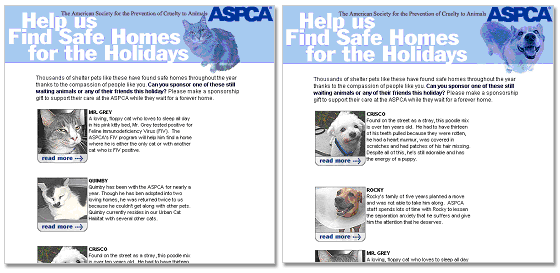|

March/April 2004
Why the ASPCA Wants to Know if You're a Cat or Dog Person: Using Constituent Information for Effective Fundraising and Marketing
Overview
The American Society for the Prevention of Cruelty to Animals (ASPCA) promotes humane principles, prevents cruelty and alleviates pain, fear and suffering in animals. To fulfill its mission, the ASPCA must reach and establish relationships with people who care about animal welfare, encouraging them to become advocates and contribute funds to advance the organization's cause.
In 2001, the ASPCA began using Convio software and services to improve its use of the Internet for fundraising, advocacy and external communications. Today, after three years of employing online marketing best practices, the ASPCA has developed expertise and methodologies that any nonprofit can apply to marketing and fundraising programs -- including techniques for collecting constituent information for use in targeted, effective online communications.
Gathering Constituent Information
The ASPCA builds and maintains constituent profiles -- the basis for targeted and personalized communications -- through online activities that any nonprofit can pursue. The ASPCA:
- Offers fast, easy Web site registration -- Approximately 1.5 - 2.5 percent of the millions of people who visit the ASPCA's Web site use the quick Web site registration feature on the home page to register, providing their email addresses and other personal information -- e.g., their animal interests, how they would like to be involved with the organization, etc. Using this and other techniques, the organization's list of online supporters grew more than 300 percent in two years.
- Provides incentives to register -- In addition to making registration easy, the ASPCA provides compelling reasons for people to register. Registrants receive educational updates about timely animal issues, advocacy alerts with easy ways to take action online, notices of adoption opportunities, useful pet care information, the latest news and engaging Web site content.
- Encourages constituents to provide information -- The ASPCA now can automatically collect information about any action that a constituent takes online. In addition, the group uses online surveys and forms to ask registrants about themselves, such as preferences for specific animals or causes, that will enable more personalized, relevant communications:
- The group conducts "profiling drives" of existing donors in which it asks donors for more information, offering them the opportunity to receive updates that match their interests.
- The ASPCA conducts additional drives to profile the remainder of its constituent file and obtain ZIP code information for localized communications.
- These drives have resulted in advanced information for about 20 percent of the group's online constituents.
ASPCA donors with email addresses tend to give more -- underscoring the importance of online outreach. They give 112 percent more in average dollars, and the number of gifts they give is about 85 percent higher than constituents who have not provided an email address. Online communication not only costs less -- since using the Internet is more cost-effective than traditional mail or telemarketing -- it also tends to generate a higher-value response.
Using Constituent Information for Effective Fundraising
One of the ASPCA's 2003 holiday campaigns demonstrates how nonprofits can turn constituent profile information into powerful appeals. The ASPCA segmented constituents into three groups: dog people, cat people and constituents for whom no profile information was available. Sending email appeals to both past donors and non-donor online prospects, the organization asked these constituents to sponsor a pet and make a donation.
The ASPCA personalized the email appeal for each of these three types of recipients by modifying its "Help us find safe homes for the holidays" message in the subject line to personalize it for the dog people and the cat people. Also, the prominence of dogs or cats in the emails was different based on the pet affinity of recipients. This personalization made the appeal more relevant and compelling for each recipient. The result: response rates for personalized appeals were three times higher than the response rates of recipients who had not provided profile information, and therefore received a more generic message.

Fig.1: The ASPCA campaign segmented constituents according to their interests, and modified
the predominant messages accordingly.
Summary: Lessons Learned
The ASPCA experience demonstrates the power of collecting and using constituent information to target and personalize online communications. Some lessons that any nonprofit can learn from the group's experience:
- Learn about your constituents -- Even if it is as simple as knowing whether someone is a dog person or a cat person, an understanding of constituents is key. The ASPCA's online solution has built-in surveys and forms that allow the group to automatically attach all constituent-volunteered information to the constituent's profile -- making it simple for the ASPCA to incrementally collect information about each constituent. In addition, every action that a constituent takes online -- e.g., donating, responding to an action alert, or registering for an event -- becomes part of his or her online profile.
- Use profile information to create relevant communications -- The ASPCA regularly collects and uses information about its constituents to send targeted communications to constituents on the issues and topics that matter most to them. This encourages them to provide support and is the basis for developing stronger relationships and loyalty.
- Make online communication a primary method for cultivating a strong and enduring constituency -- The ASPCA understands the importance of the online medium for providing informative and relevant communications to its constituent base. Using a strategic online communication program that includes best practices and sophisticated online software, the ASPCA has developed stronger donors and activists.
|
|
|



